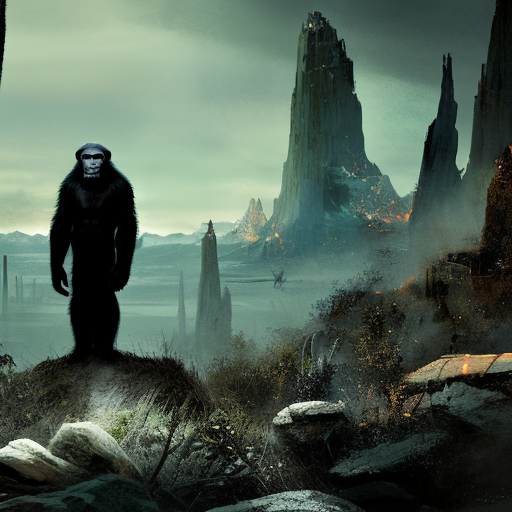One-line summary: In the book “Planet of the Apes,” a group of astronauts crash-land on a mysterious planet ruled by intelligent apes, challenging their understanding of civilization and humanity.
Crash Landing on a Mysterious Planet
After a long and arduous journey through space, a group of astronauts led by Colonel George Taylor crash-lands on a seemingly desolate planet. As they explore their surroundings, they quickly realize that they are not alone. The planet is inhabited by a civilization of highly intelligent apes who rule over a primitive human society. The humans are treated as inferior beings, subjected to slavery and experimentation.
The Struggle for Survival and Freedom
As the astronauts navigate this strange new world, they find themselves caught in a battle for survival and freedom. Taylor, played by Charlton Heston in the film adaptation, becomes a captive of the apes but manages to gain the attention of two sympathetic chimpanzees, Zira and Cornelius. Through their help, he escapes and embarks on a quest to uncover the truth about the planet and find a way back home.
A Mirror to Human Society
“Planet of the Apes” serves as a thought-provoking allegory, reflecting on the flaws and complexities of human society. The ape civilization, with its rigid social hierarchy and prejudice against humans, mirrors the injustices and inequalities present in our own world. The book explores themes of power, prejudice, and the consequences of unchecked scientific progress.
As Taylor delves deeper into the secrets of the planet, he discovers a shocking truth. The planet he thought was a distant alien world is, in fact, Earth itself, thousands of years in the future. The apes have evolved into the dominant species, while humans have regressed into a primitive state. This revelation forces Taylor to confront the destructive nature of humanity and question the very essence of civilization.
- Power and its corrupting influence: The ape society is marked by a power struggle between different factions, highlighting the dangers of unchecked authority.
- Prejudice and discrimination: The treatment of humans as inferior beings by the apes reflects the prejudice and discrimination prevalent in human societies.
- The consequences of scientific progress: The book raises ethical questions about the limits of scientific advancement and the potential consequences of playing with nature.
“Take your stinking paws off me, you damned dirty ape!” – Colonel George Taylor
In this iconic quote, Taylor expresses his frustration and defiance towards the oppressive ape society. It encapsulates the struggle for freedom and the clash between human and ape civilizations.
In conclusion, “Planet of the Apes” is a captivating science fiction novel that explores themes of power, prejudice, and the consequences of unchecked scientific progress. Through its allegorical narrative, it holds a mirror to human society, challenging readers to reflect on the flaws and complexities of our own civilization. The book’s enduring popularity is a testament to its thought-provoking themes and its ability to captivate readers with its thrilling and suspenseful storyline.












